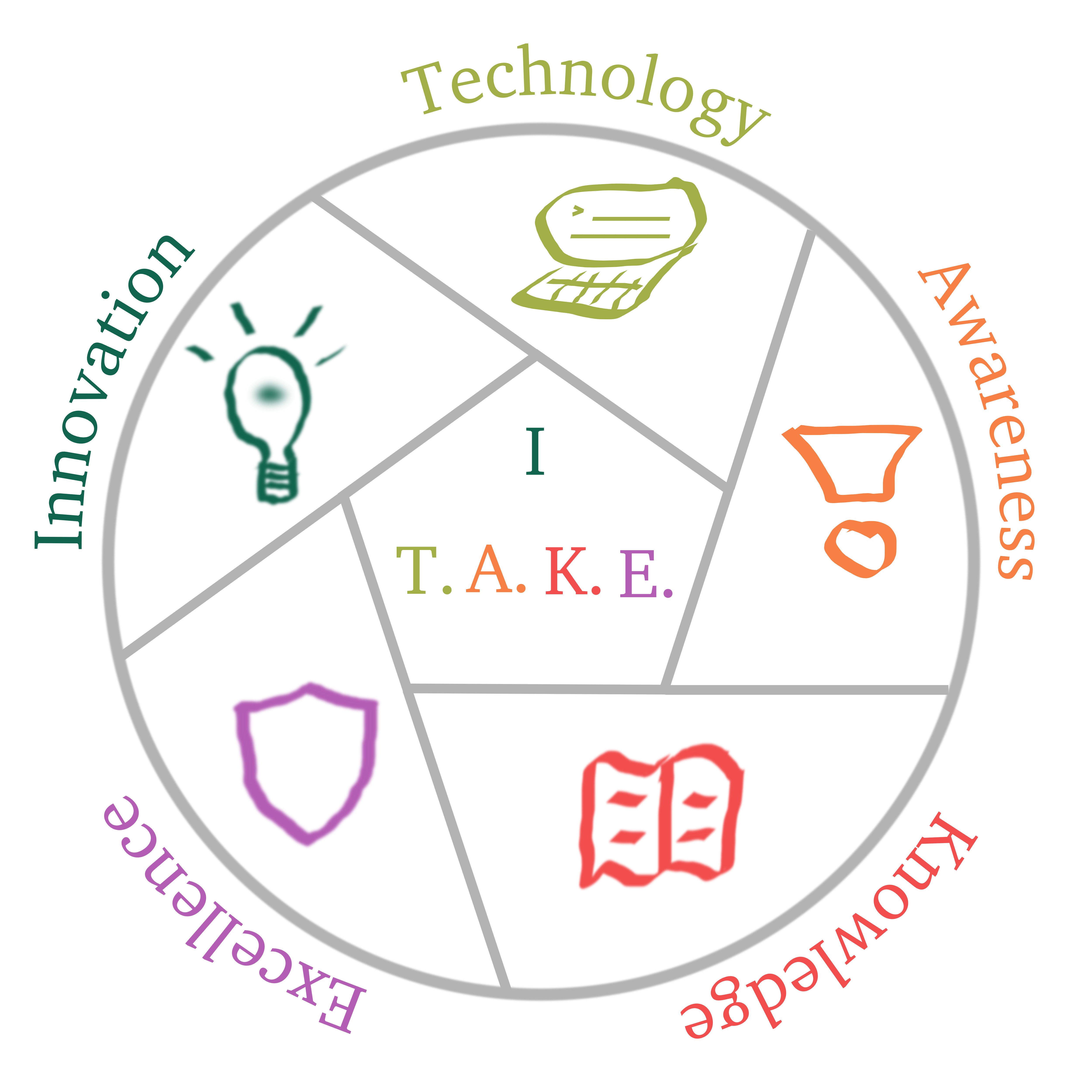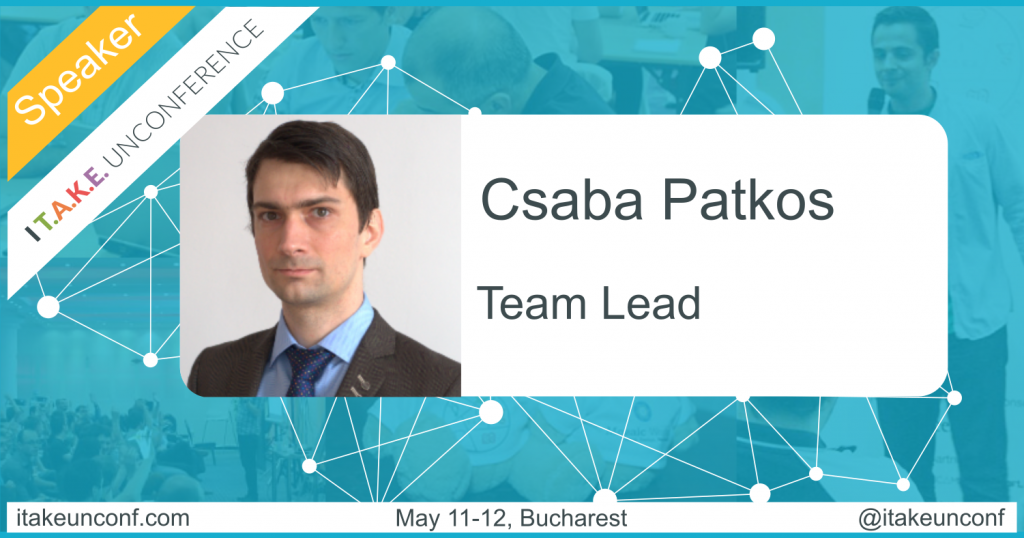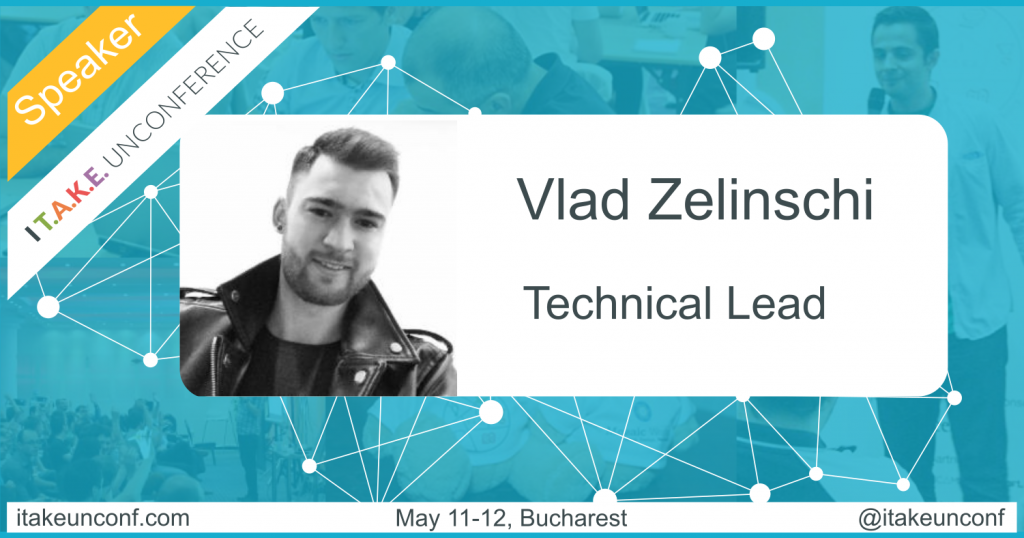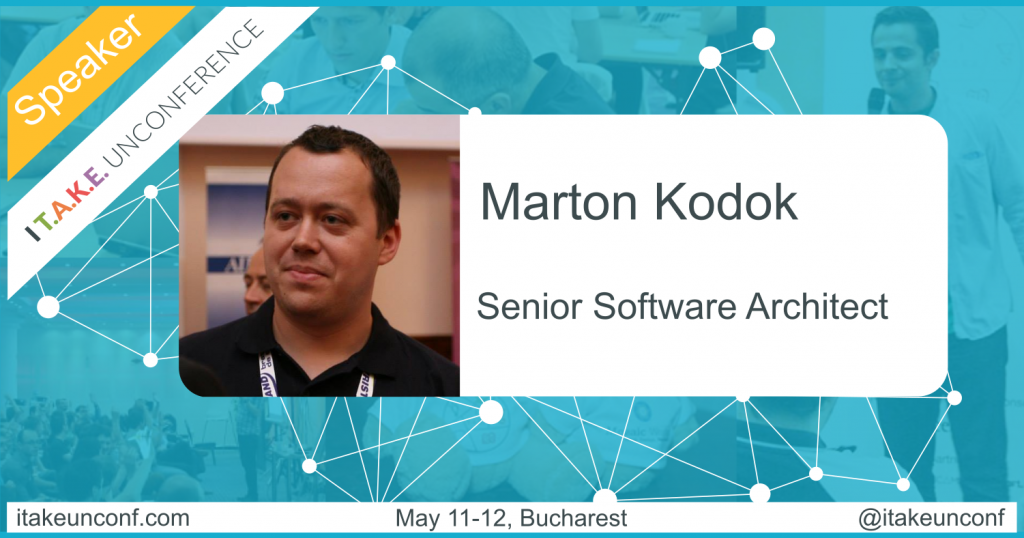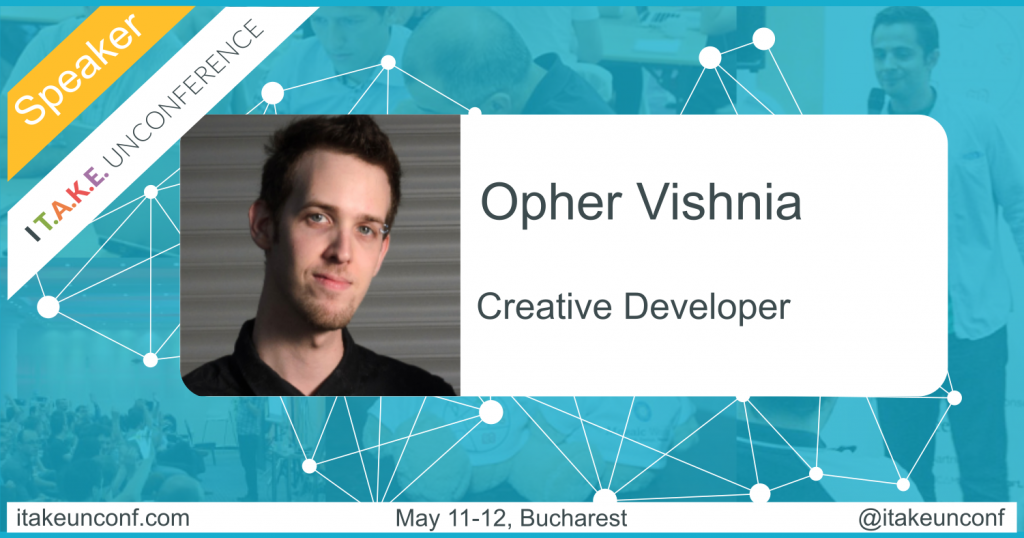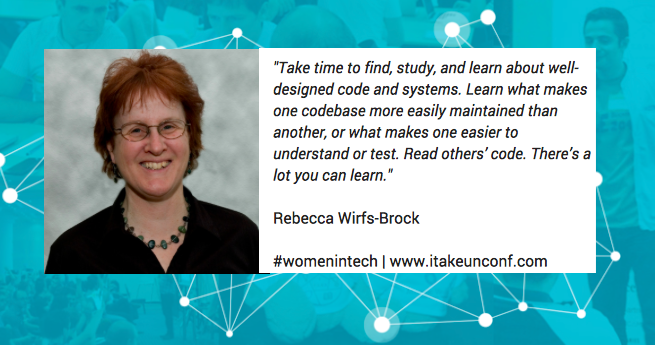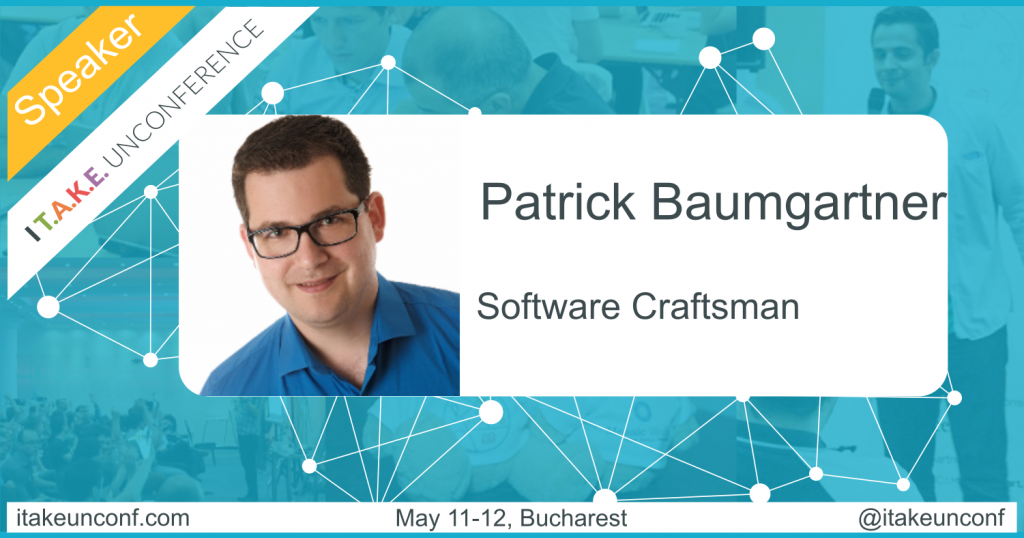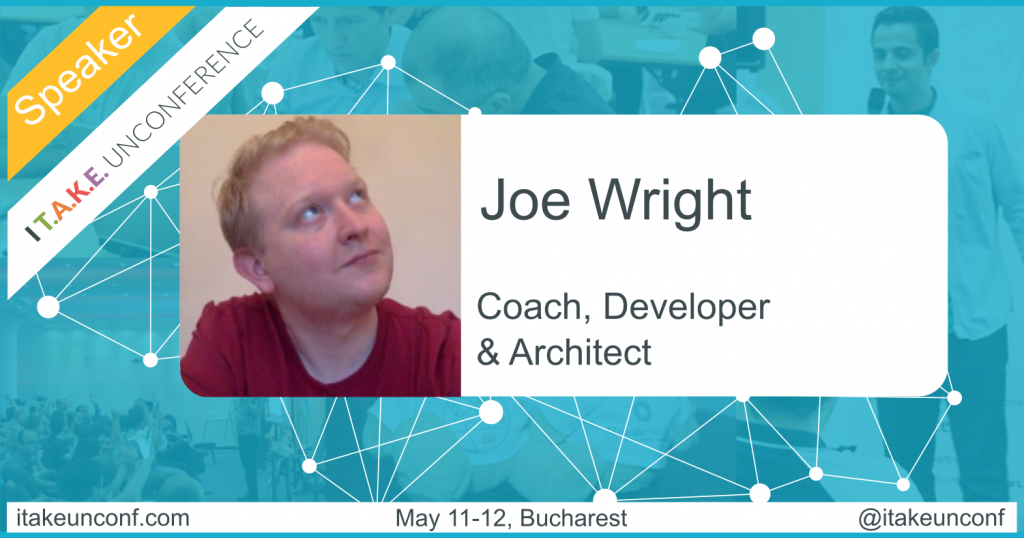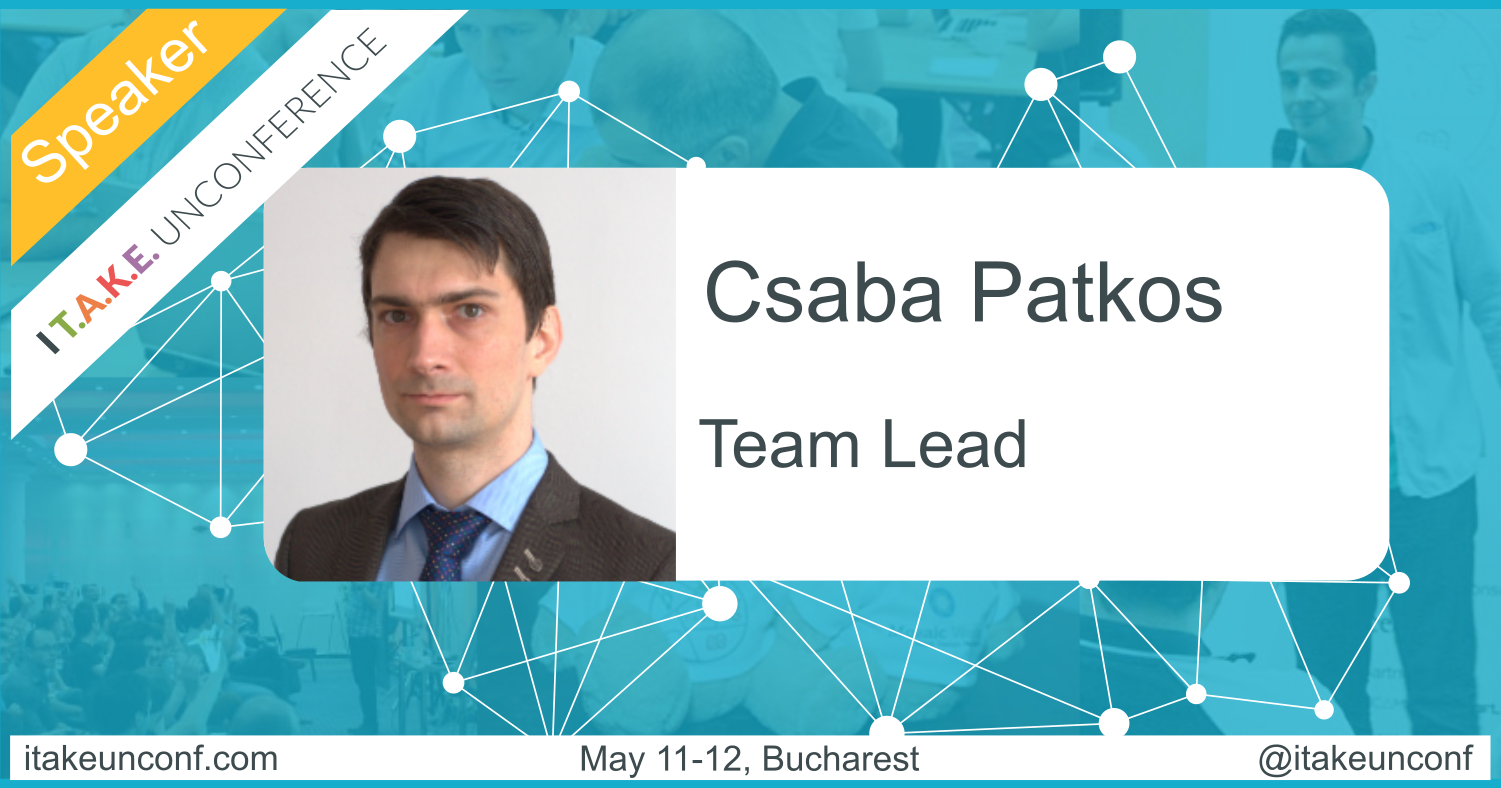 Announcements
Announcements
Developers are not computers
Enjoy the following series of interviews with the speakers, top-notch software crafters from across Europe, joining I T.A.K.E Unconference, Bucharest, 11-12 May. Discover the lessons learned and what drives them to challenge the known path in their field.
Csaba Patkos, Team Lead Syneto, is a technical practitioner with 15 years of experience in the field. Joining #itakeunconf 2017 as speaker, he will share more in his talk about his experience of growing up as a team leader, mentor, and coach for the team he works with daily.
#1. Please share with us 5 things you did that helped you grow & become the professional you are today
- Reading … I mean a lot. 40-50 books / year are doable. They can mix in a few novels / literature as well.
- Made plans and fought to achieve them. Think about where you want to be in 6 months or 1 year and define the steps you need to take to get there.
- I love programming and software engineering. I do it daily, with dedication.
- Built some useful daily habits that are helping me to get better. For example listen to audio books when driving, daily reading, daily plan of work, etc.
- Talked to the people I admire and I used these talks as sources of inspiration. So, don’t be afraid to approach your professional idols, they are people just like you.
#2. What challenges will the participants find solutions to during your session at I T.A.K.E Unconference 2017?
√ Some people just won’t listen to you.
√ Some people just want to force their ideas on you.
√ Some people don’t care about the topic, they just pick fights with you.
√ Some people think you don’t care, even though you really do.
√ Other communication issues.
#3. Recommend for the participants 3 sources you find inspiration from and would help them better understand you
Want to join Csaba and ~300 software crafters from around Europe?
Register now for I T.A.K.E Unconference 2017!
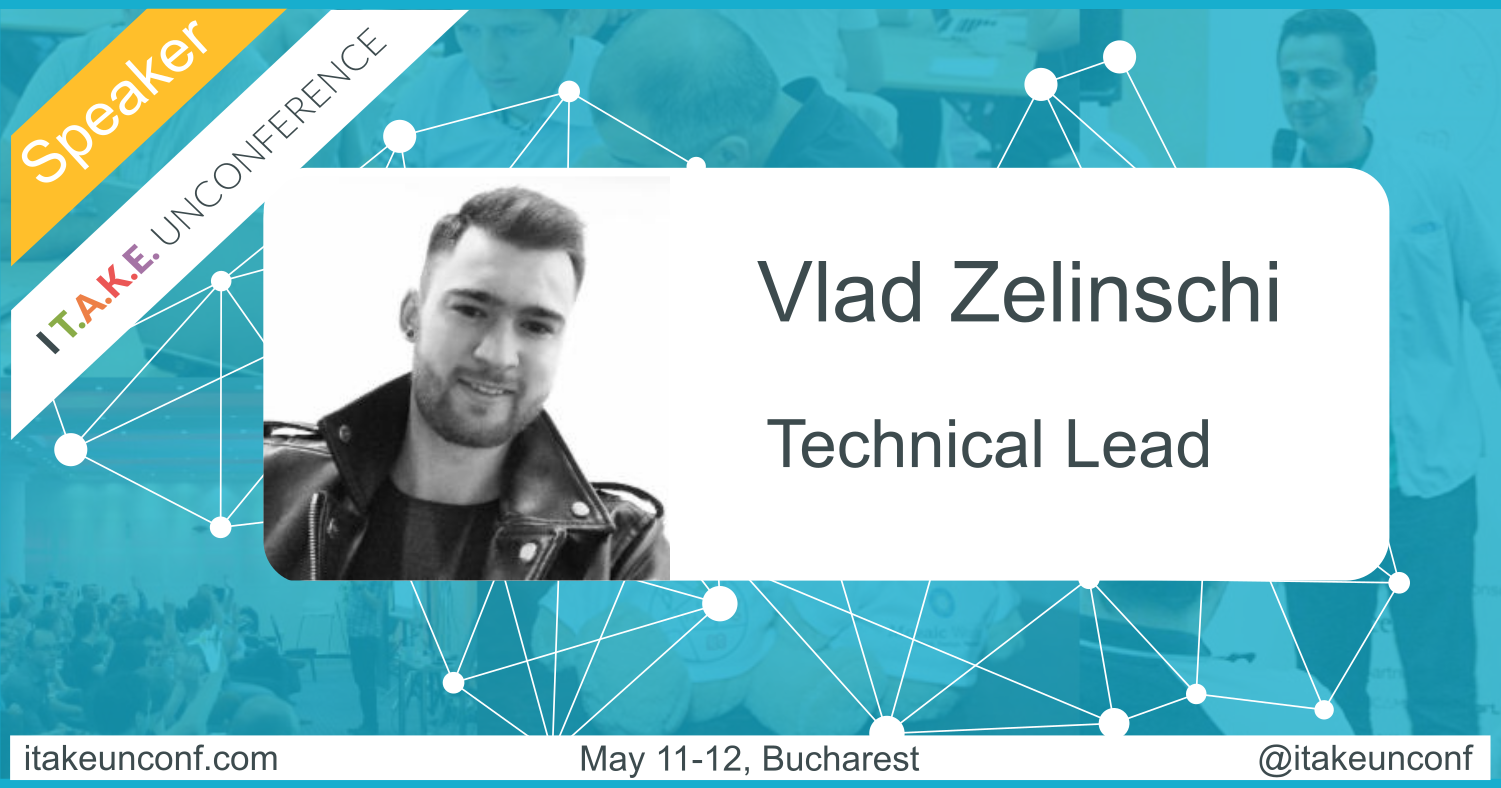 Announcements
Announcements
Progressive Web Apps – The Future
#1. Share with us 5 things that helped you grow and become the professional you are today
#2. What challenges will the participants find solutions to during your session at I T.A.K.E Unconference 2017
#3. Recommend for the participants 3 sources you find inspiration from and would help them better understand you
Want to join Vlad, +30 international speakers and ~300 software crafters from around Europe?
Register now for I T.A.K.E Unconference 2017!
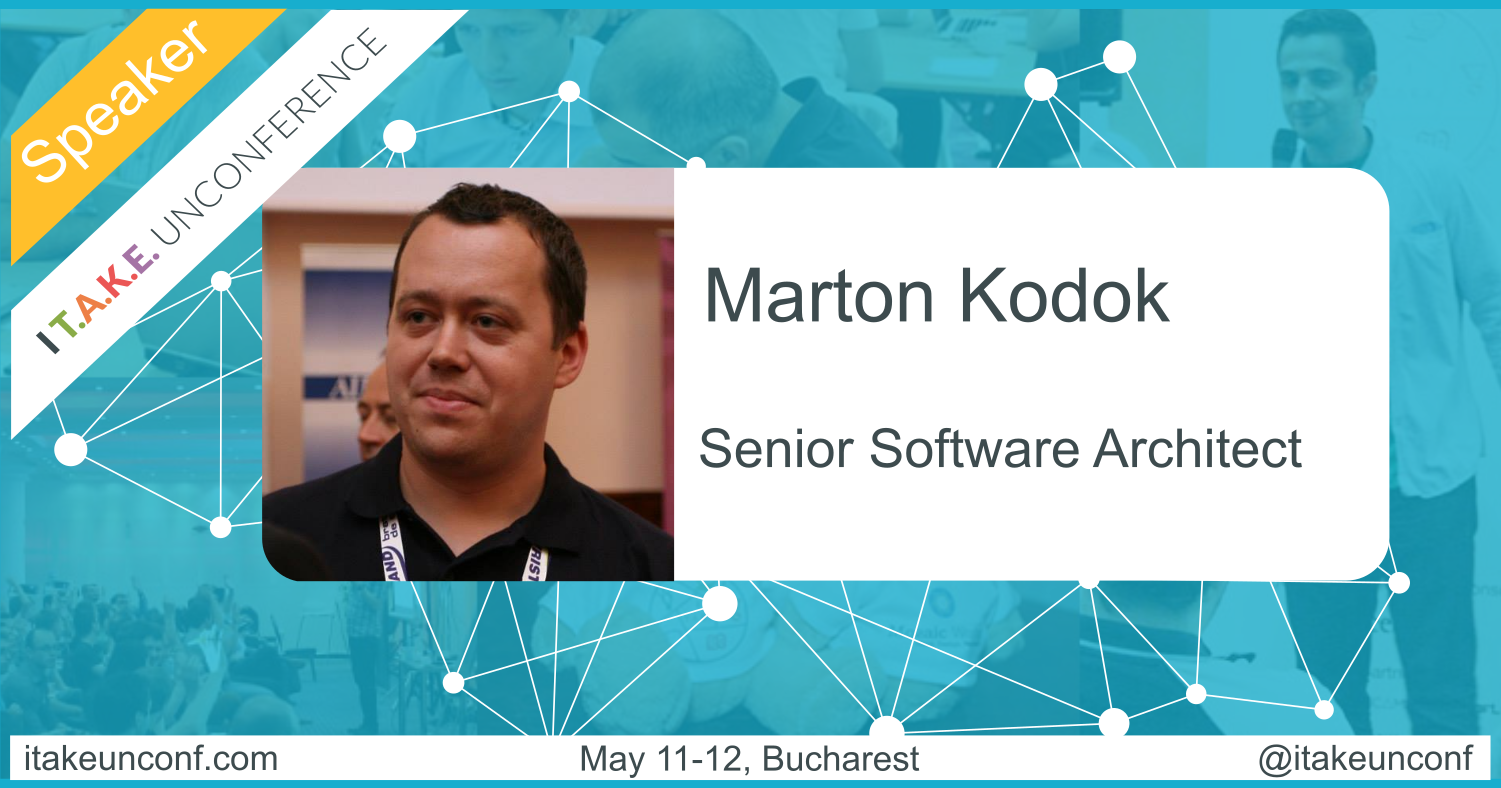 Announcements
Announcements
Powering Interactive Data Analysis with Google BigQuery
#1. Please share with us 5 things you did that helped you grow & become the professional you are today
#2. What challenges will the participants find solutions to during your session at I T.A.K.E Unconference 2017?
#3. Recommend for the participants 3 sources you find inspiration from and would help them better understand you
Want to join Marton and ~300 software crafters from around Europe?
Register now for I T.A.K.E Unconference 2017!
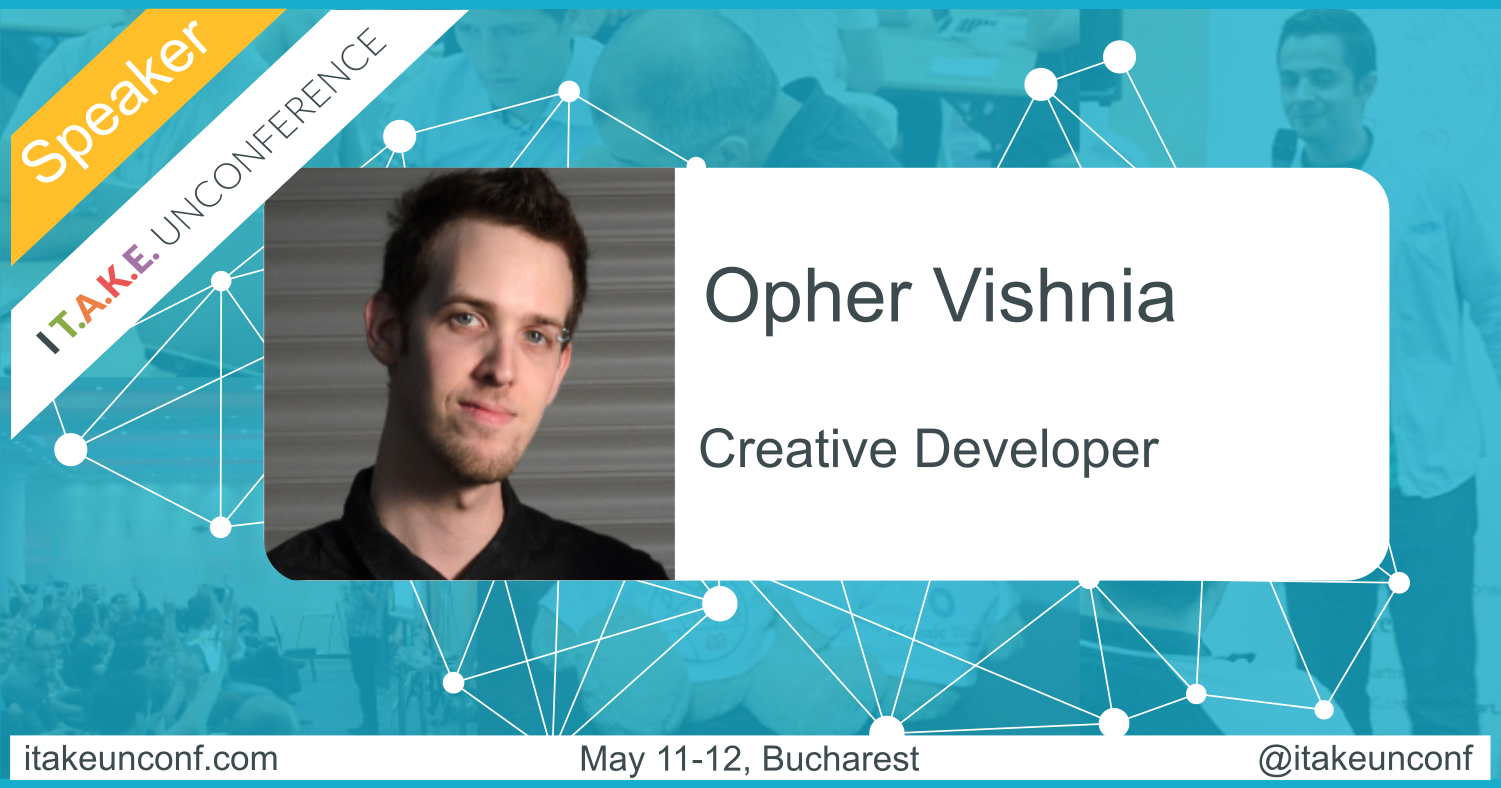 Announcements
Announcements
Building a multiplayer game server and keeping (most of) your hair
#1. Please share with us 5 things you did that helped you grow & become the professional you are today
#2. What challenges will the participants find solutions to during your session at I T.A.K.E Unconference 2017?
#3. Recommend for the participants 3 sources you find inspiration from and would help them better understand you
Want to meet Opher, +30 international speakers and ~300 software crafters from around Europe?
Register now for I T.A.K.E Unconference 2017!
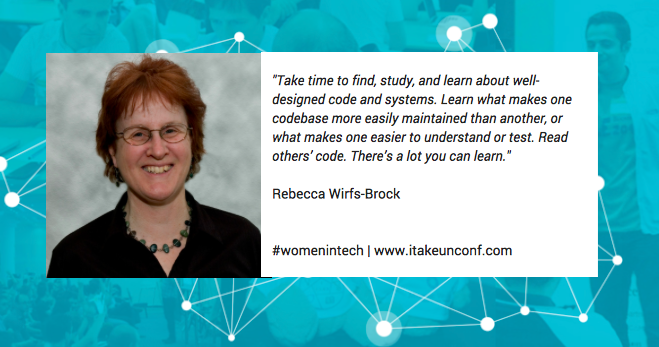 Women In Tech
Women In Tech
Rebecca Wirfs-Brock | #womenintech interview
Rebecca Wirfs-Brock is the object design pioneer who invented the set of design practices known as Responsibility-Driven Design (RDD), the first behavioral approach to object design. She is the lead author of two software design books and design columnist for IEEE Software. By accident, she started the x-Driven Design meme (TDD, DDD, BDD…). Although best known for software design, she is has a passion simply expressing complex requirements and effectively communicating software architecture. Rebecca joined #itakeunconf in 2013 as keynote, at the first edition of the unconference.
When sharing more about #womenintech, Rebecca is one of the most important role models ladies in the field mention or look up to. Read on to find her professional story and lessons learned along the way.
#1. What’s your professional story? Why did you choose to develop a career in this domain?
I went to university with no idea what I would major in. I liked both sciences and the humanities. I had a part time job at school grading tests. We’d scan the tests (which were marked in pencil) onto a tape, then take that tape to the computer center. They would run a job to print out students’ test results and grades.
I wanted to learn how that program worked. So for fun, I took my first computing class learning FORTRAN. And I was hooked. Writing programs was not only fun; programs could do something useful. So that is how I discovered programming—by accident. I liked solving problems by programming. I still do.
#2. Share with us an important lesson you’ve learned since you’ve been working in IT
I’ve learned that you won’t know if something is possible unless you try doing it. Sometimes we hold ourselves back because we don’t think we can do what seems like some seemingly impossible task. If you are a part of a team, you can do even more great things than you can on your own.
Being a software engineer at Tektronix (a company that made oscilloscopes and workstations, among other hardware products), I learned that with good team collaboration, the right management support, and the belief in what we were doing, we could do amazing things. I have taken this spirit of collaboration and can-do attitude with me throughout my career.
#3. What piece of advice would you give to the next generation of #womenintech?
Keep learning. The programming languages, tools, libraries, and database technologies you work with 10 years from now will be different from those you use today. There’s always something new to learn. Don’t just limit yourself to learning new programming languages and tools or the latest popular libraries. Take some time to learn things outside of your daily work. For example, I turn to blog by Adrian Colyer, The Morning Paper, https://blog.acolyer.org/. I find reading about technology trends and research stretches my brain. And then I get on with my daily work.
Take some time to learn things outside of your daily work. For example, I turn to blog by Adrian Colyer, The Morning Paper. I find reading about technology trends and research stretches my brain. And then I get on with my daily work.
But more importantly, take time to find, study, and learn about well-designed code and systems. Learn what makes one codebase more easily maintained than another, or what makes one easier to understand or test. Read others’ code. There’s a lot you can learn.
At I T.A.K.E Unconference, we aim to move the needle by offering to women in tech access to a fast-learning, practical & inspirational community for their growth. Join the 5th edition, 11-12 May, Bucharest and meet remarkable tech ladies.
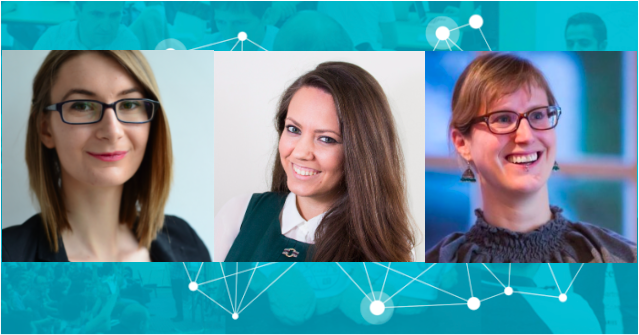 Women In Tech
Women In Tech
Let’s make a difference, together! – Women in tech @I T.A.K.E Unconference
Less than 1 in 4 leadership roles in the tech industry are held by women. This situation can be improved, for sure!
At I T.A.K.E Unconference, we aim to move the needle by offering to women in tech access to a fast-learning, practical & inspirational community for their growth.
Each year, remarkable women crafters join #itakeunconf. At this edition, you can meet:
- Felienne Hermans | Keynote | University Assistant & Founder | Research in the programming field
- Karina Popova, Head of Development | Artificial Intelligence & IoT
- Alexandra Marin, Software developer | Mobile Development
Let’s not stop here! Help us meet other remarkable women, from your teams and communities!
For you to easier join us, we are offering a free ticket and a special discount to tech ladies who will share with us one lesson learned from the IT trenches.
Let us know in a comment your story / experience / lesson learned while working in IT. The most inspirational story will win a free ticket. Everyone sharing their experience & lessons learned will receive 40% discount from the Standard ticket price (in the limit of available seats). Deadline to submit your story is March 16th.
We will announce the winner on March 22nd.
I T.A.K.E Unconference, 5th edition, 11-12 Bucharest. 6 keynotes, +30 international speakers, and an intense and dynamic program with topics like DevOps, AI, IoT, Software Design, Mobile, Architecture, Open Space, Kata Lounge, Programming Contest and more is in the row. Register now!
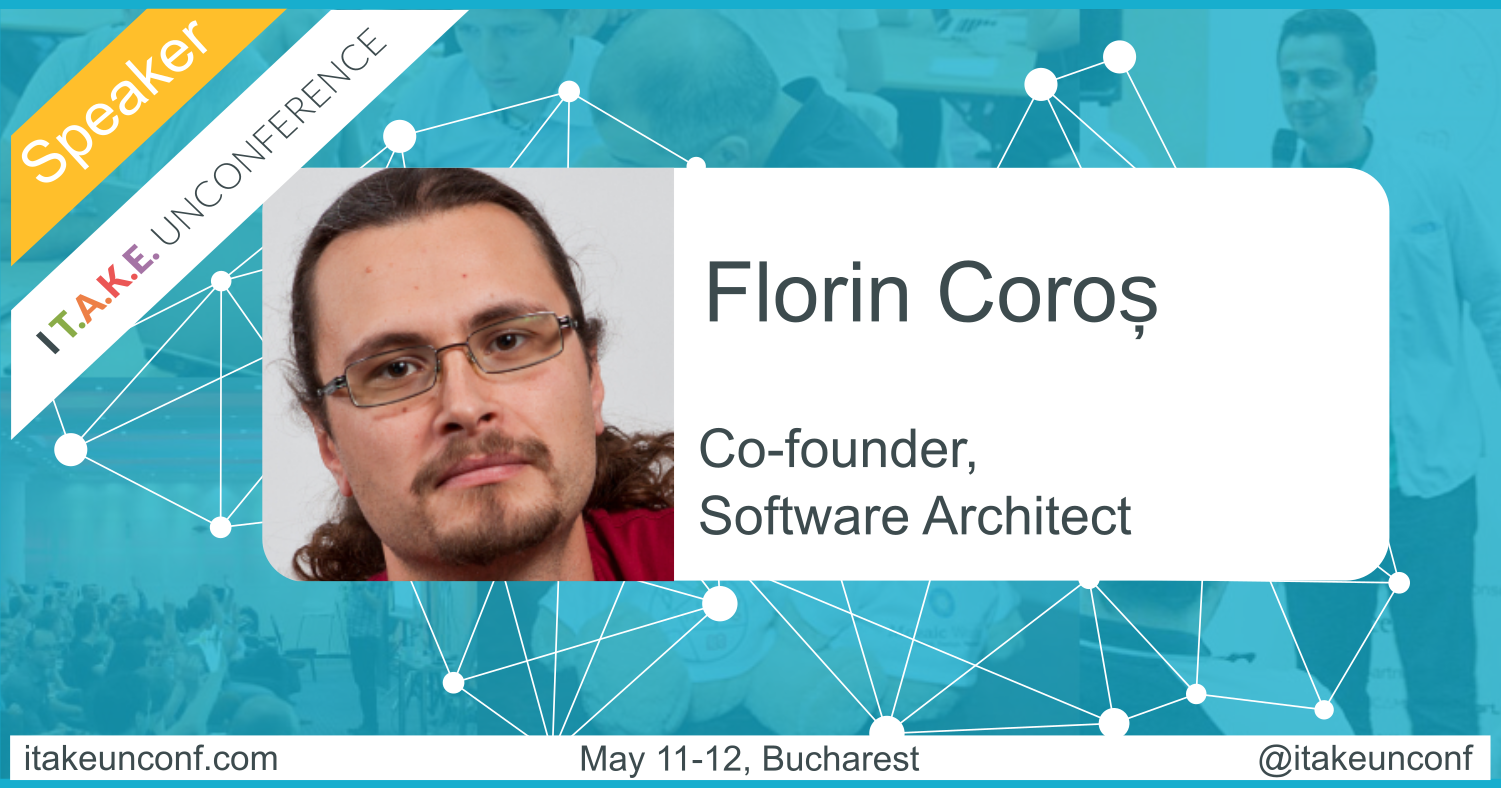 Announcements
Announcements
In-Process or Inter-Processes Communication at Deploy Time
Enjoy the following series of interviews with the speakers, top-notch software crafters from across Europe, joining I T.A.K.E Unconference, Bucharest, 11-12 May. Discover the lessons learned and what drives them to challenge the known path in their field.
Florin Coroș, Co-Founder and Partner iQuarc, is a passionate software architect and developer who has been working for more than 10 years in a wide variety of business applications using Microsoft technologies. At #itakeunconf, Florin is sharing more about In-Process or Inter-Processes Communication at Deploy Time.
#1. Please share with us 5 things you did that helped you grow & become the professional you are today
There might be a fortunate series of events, which fit nicely with my personality and abilities.
One of the things that helped me a great deal, was the fact that I changed the contexts and projects often. Even if I worked for the same company and the same technologies for about 10 years, I have changed the projects, the clients and my role at least once in two years. It wasn’t something that I had planned, but I always wanted to learn and experience new things.
Change is always challenging and creates opportunity for learning and for professional growth.
Another important thing for me, I think it was the fact that I always look for professional models. First, I discovered Uncle Bob, then there were Martin Fowler, J.B. Rainsberger, Roy Osherove, Kent Beck, Juval Lowe, Jurgen Appelo, Richard Campbel, and many others (I remember having a slide with some of these guy’s pictures in one of my first talks I’ve given at a conference ☺ ). Reading their books and articles, and then trying to apply their ideas in my day to day work, inspired and helped me.
Attending to training and conferences is another important thing. The TDD workshop with J.B. Rainsberger, which I attended back in 2010 was a few years jump ahead in my career. After, there were many other high-quality training I had the opportunity to attend, like the IDesign Master Class with Richard Campbel, a workshop with Dan North, or a Requirements course with Kay and Tom Gilb.
Coding just to practice is another thing that makes a difference. I learned this at the Code Retreats and I’ve kept this good habit. From time to time I take a few hours and I just write code with the purpose of learning or practicing. It always pays back.
#2. What challenges will the participants find solutions to during your session at I T.A.K.E Unconference 2017?
In large enterprise applications, there is always the challenge of decomposing the system. From performance considerations we may end up loading all the services in one or two processes, ending up with a monolith, which doesn’t scale and it is costly to maintain. At the other end, we have one process for each service resulting in too many inter-process call hops to handle one user request, which is bad for performance and it may be costly to maintain.
I’ll show a way, which I’ve applied in some projects I’ve architected, on how to separate this communication concern from implementing the business functionality.
#3. Recommend for the participants 3 sources you find inspiration from and would help them better understand you
- My blog of course ☺ onCodeDesign.com . There, it is more about me and my thoughts
- .NET Rocks (https://www.dotnetrocks.com/) is a podcast I recommend especially to .NET developers, and also to any geeks
- As a hobby, I recommend learning and playing GO. Even if it a time-consuming game, it is a very good exercise for the mind.
Want to meet Florin, +30 international speakers and ~300 software crafters from around Europe?
Register now for I T.A.K.E Unconference 2017!
 Announcements
Announcements
Impact Mapping | Patrick Baumgartner
#1. Share with us 5 things from your experience that helped you grow & become the professional you are today
- having a mentor who supports you is great and helps you to challenge your ideas and decisions
- being curious helps you to continuously learn new things
- teaching others helps you to get better on the topic and you learn how to explain things to others
- meeting continuously new people to create new ideas and get inspiration
- having enough rest so that your brain has time for recreation
#2. What challenges will the participants find solutions to during your session at I T.A.K.E Unconference 2017?
#3. Recommend for the participants 3 sources you find inspiration from and would help them better understand you
- Learn from and with others, by getting involved in local / international practitioners communities. For example, we run in Zurich a monthly Software Craftsmanship Meetup with very diverse topics
- Attend conferences to get inspired by the talks and workshops, as well as the discussions with participants and other speakers.
- Take time for yourself, relax, free your mind and new ideas and thoughts will pop up automatically!
Want to join Patrick, +30 international speakers and ~300 software crafters from around Europe?
Register now for I T.A.K.E Unconference 2017!
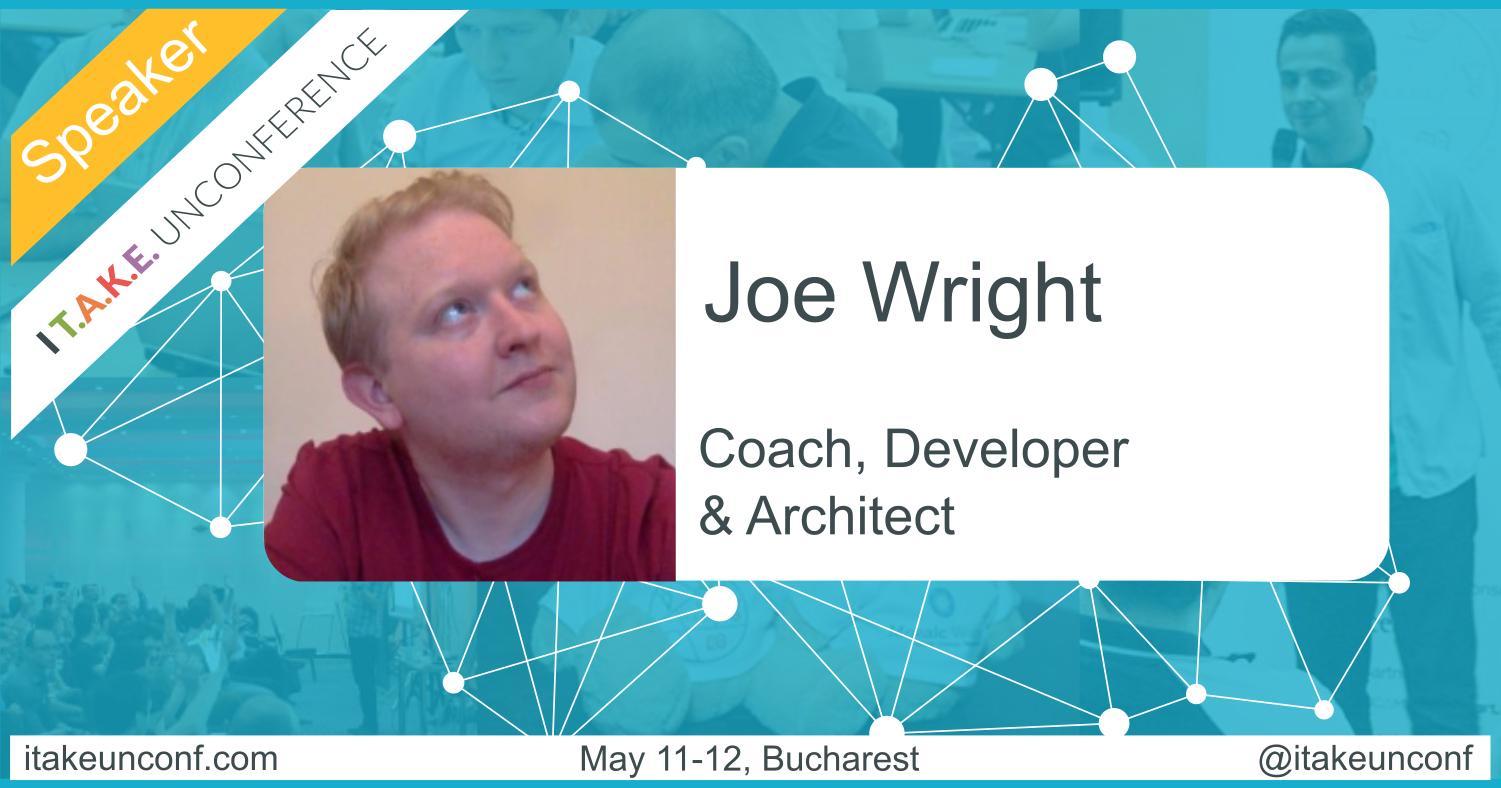 Announcements
Announcements
16 years of legacy code with mob programming and Lego | Joe Wright
#1. Share with us 5 things from your experience that helped you grow & become the professional you are today
Seek out opportunities to see the world from the other functions in software. If you tester goes on holiday then volunteer to stand in for them. If you have an ops team then ask to pair on making the release process smoother. Facilitate a retrospective for another team. Run a usability session with real world users to see how your product is used. Stepping into another roles shoes helps build empathy, which will allow you to work better with others people in the future.
#2. What challenges will the participants find solutions to during your session at I T.A.K.E Unconference 2017?
- How can I reduce communication, approval, and tech debt issues from slowing down my team?
- How can I measure and improve how a dev team spends their time?
- How can I get started doing this at my work?
#3. Recommend for the participants 3 sources you find inspiration from and would help them better understand you
- Deep Work: Rules for Focused Success in a Distracted World by Cal Newport (book)
- Facilitation advice – available here
- The Goal by Eliyahu M. Goldratt and Jeff Cox (book)
Want to join Joe, +30 international speakers and ~300 software crafters from around Europe?
Register now for I T.A.K.E Unconference 2017!
